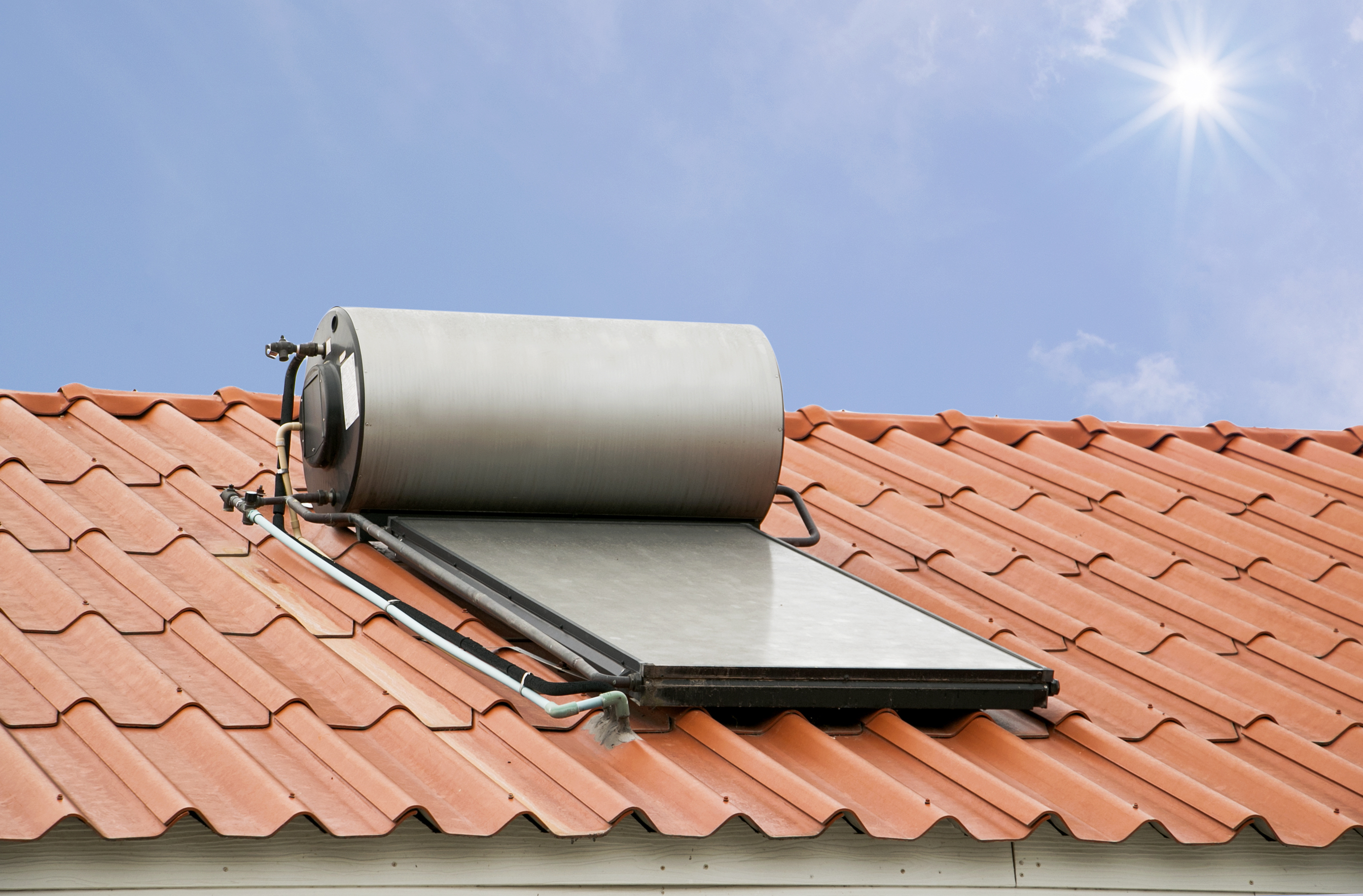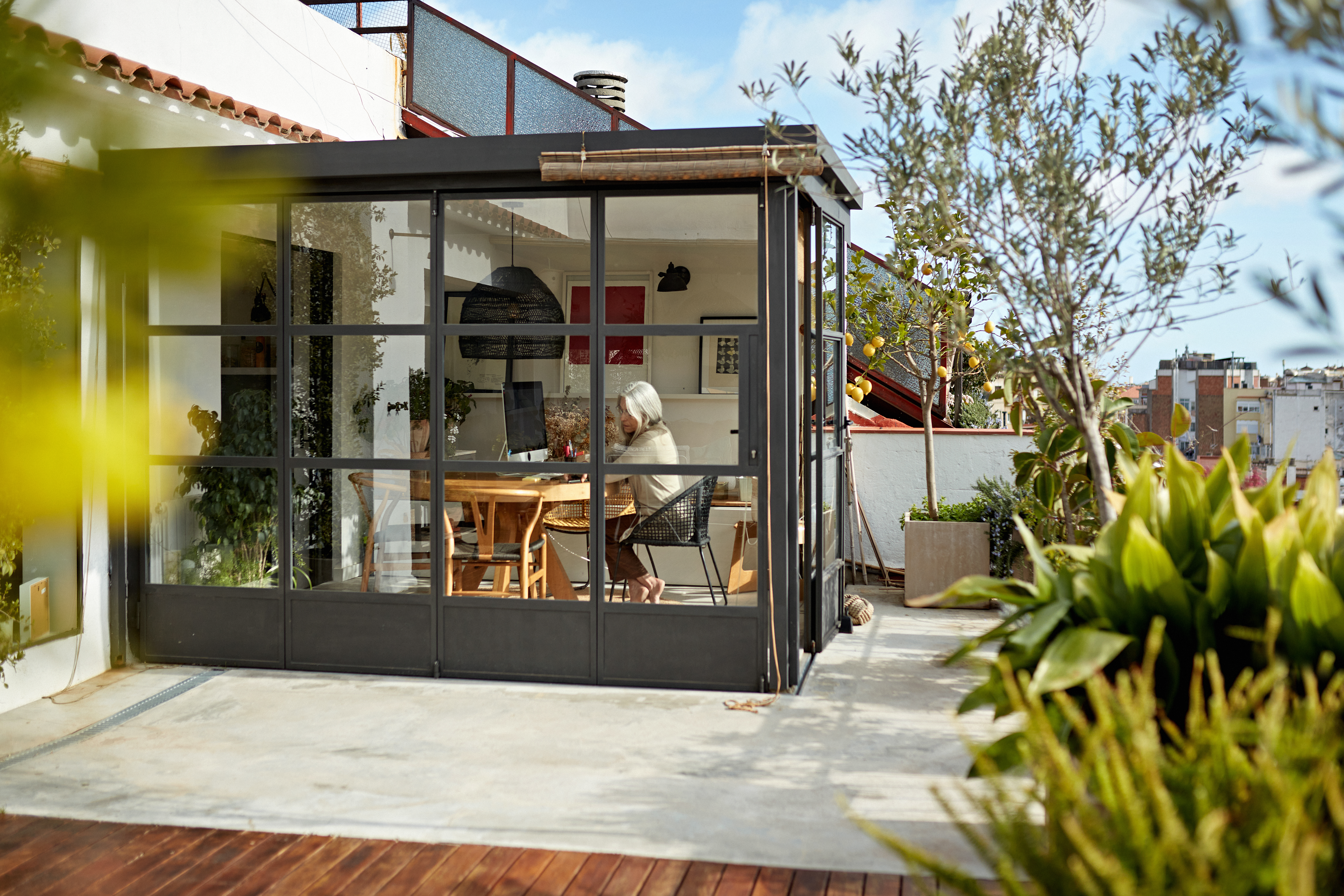5 Different Types of Water Heaters

Picture this: it’s the dead of winter and you’ve just finished shoveling your driveway after a full hour of snow-slinging. Nothing sounds better than a warm shower to bring life back into your frozen body, but upon cranking the hot water, only cold water comes out. Your water heater has bit the dust and the timing couldn’t be worse.
In a perfect world, water heaters would be invincible—no test of time or durability could phase them—but in reality, the average water heater only lasts 8-12 years. When it’s time to replace your water heater, you may quickly realize that not only are there several types of water heaters out there, but each comes with different benefits and drawbacks. With so many modern options on the market, it’s always better to be equipped with the knowledge of your many options rather than leaving it up to random-choosing or a potentially biased professional.
There are five main types of water heaters; conventional, tankless, heat pump, solar, and condensing. Each comes with its own technological advancements and energy efficiencies, so it’s well worth your time to understand the differences between each to make an informed decision.
Using this guide, we’ll walk you through all five water heater types and dive into the pros, the cons, and the many reasons why one water heater may be better for your home than another.
- Conventional Water Heater
- Tankless Water Heater
- Heat Pump Water Heater
- Solar Water Heater
- Condensing Water Heater
Types of Water Heaters
1. Conventional Water Heater
Conventional water heaters are among the most popular water heater options. They feature a sizable insulated tank where water is stored and warmed.
Pros:
- Lower initial cost: Unless you opt for an ultra-modern model, you’ll likely spend far less on the initial up-front costs of a conventional water heater than you would for any of the four alternatives.
- Efficient across all climates: No matter where in the world you live, you can rest assured knowing that a conventional water heater will function to perfection. Solar, tankless, and heat pump water heaters all require specific conditions for optimal performance. A conventional water heater will deliver steady and seamless performance provided proper upkeep is maintained.
- Lower installation costs: In addition to attractive initial costs, conventional water heaters are also inexpensive to have installed. This, of course, depends on where in your home you plan on installing, and where you may need plumbing, gas, and electrical configurations. Typically, installation costs tend to be lower than the alternative installation types.
Cons:
- Increased energy waste: Because conventional water heaters house a constant well of warm water, they are constantly using energy to maintain the temperature. On the contrary, tankless models only heat water as it’s needed.
- Space hog: There’s no getting around the size of a conventional water heater. Because they are designed to accommodate a reservoir of warm water, they tend to run on the larger spectrum of size.
- Vulnerability to water damage: One of the most notable fatal flaws to conventional water heaters is their potential for water damage. In the event that you forgo regular routine maintenance checks, you could end up dealing with rust and corrosion that could comprise the functionality and health of your water heater. This could even lead to extensive, and dramatically expensive, water damage to your home.
2. Tankless Water Heater
Tankless water heaters are able to produce instantaneous hot water through super-heated coils. These coils fill up with water the instant you demand it, offering near-limitless hot water for your home.
Pros:
- Instant hot water: Rather than waiting for cool water to turn into warm water, and warm water to turn into hot water, tankless water heaters provide instant hot water the moment you demand it. Because tankless water heaters only heat water when you need it, they require less overall energy, especially compared to a conventional heater that maintains a constant warm well.
- Space-saving: One of the most notable benefits of a tankless water heater is its compact size. Without the need for a constant reservoir of water, tankless models don’t require any bulky storage space. This makes them easy to mount on walls or store in compact nooks and crannies.
- Lower month-to-month costs: Suiting up your home with a tankless water heater effectively lower your month-to-month costs, saving you hundreds of dollars on an annual scale, too. The decreased need for energy flow allows you to enjoy the fruits of your power-saving choice.
Cons:
- Higher initial cost: Even the most affordable tankless heater options begin at $1, 000 whereas the average conventional water heater will run around $500. While there are many benefits to making the switch, those on a budget will have to wait some time before making up the cost differential.
- Limited supply of hot water: For smaller families, a tankless water heater is perfect—for a larger family, the supply of hot water may run out should too many demands being made at a given moment. For example, if someone is taking a shower while the dishwasher is running, the hot water demand will likely go cold.
- No outstanding benefit compared to similar inexpensive options: Tankless water heaters are considerably more expensive than a number of other water heater options but don’t necessarily come with wildly impressive perks that are hard to find with cheaper alternatives. It could take anywhere between 6 and 12 years to make up the initial and installation costs before the month-to-month savings kick in.

3. Heat Pump Water Heater
Heat pump water heaters, also known as hybrid water heaters, are designed to work without directly generating heat. By using the heat in the ground and surrounding air, the only electricity used is dedicated to moving heat from point A to point B.
Pros:
- Money-saving: According to Consumer Reports, heat pump water heaters use about 60% less energy than conventional heaters. Though heat pump heaters tend to run a higher average cost than tankless models, you’ll see the fruits of energy-saving payback at a faster rate. Conserve water at home without any habit changes with a heat pump system.
- Long-term efficiency: Heat pump water heaters are the most efficient alternatives to fuel, oil, and electric water heating systems. For those in the market for a water heater that is both energy-efficient and cost-efficient, heat pump water heaters show great promise.
- Less Maintenance: When it comes to regular maintenance, heat pump systems are incredibly unfussy. Requiring check-ins only once a year, keeping your hybrid system in check can be easily self-assessed and completed—energy-efficient HVAC professionals or pricy labor bills required. It is recommended that a professional checks on your system every 3 to 5 years.
Cons:
- Mediocre life span: Heat pump water heaters typically come with life spans averaging out to 10 years. Next to solar and tankless heaters that average out at 20 years, and conventional systems that average between 10-15 years, heat pump water heaters shy in comparison.
- Space requirements: Heat pump water heaters require at least 1, 000 cubic feet of space to operate safely and at optimal efficiency. It’s also worth noting that hybrid water heaters can only be installed in climates that stay between the temperatures of 40 degrees and 90 degrees— so those living in the frigid north or the sizzling south may be out of luck.
- Carbon neutral: Though heat pump water heaters do not directly generate electricity, they are considerably dependent on it for seamless functionality. Those looking for a water heater option that reduces their carbon footprint will likely frown upon this carbon-neutral system.
4. Solar Water Heater
Solar water heaters depend on the power of the sun. They work by using roof-mounted panels that transfer energy through a closed-loop system that connects to the water tank which then warms the water.
Pros:
- Uses renewable energy: Solar water heaters are the most energy-efficient water heater options available today. Because solar power is completely dependent on sunshine, it can be harnessed wherever the sun’s rays reach on any given day.
- Lower utility bills: In addition to being incredibly eco-friendly, solar panels are also incredibly cost-friendly. While the initial installation cost could put a dent in your wallet, you could significantly reduce both your water and electricity bills when you make the solar switch.
- Tax credit eligibility: The federal government has made a huge push toward incentivizing solar panel projects. There are a number of federal-level tax credits that can assist with the installation costs incurred.
Cons:
- Only great for climates with plenty of sunshine: If you live in a shady area or a climate that gets more rainy days than sunny ones, upgrading to a solar water heater may not prove as fruitful as it would for residents living in Southern California or coastal Florida. Though solar power can be collected on gray days, consecutive low-sun days can have a noticeable impact on your system's performance.
- Cost of installment: The cost of installing solar panels is one of the most notable downsides to solar water heating. Fortunately, there are a number of financing programs that make the payment process easier if you’ve set your sights on switching to solar power.
- Rooftop space requirements: The more electricity you demand from your solar panels, the more solar panels you’ll actually need. The more solar panels, the more roof space you’ll need to dedicate. If your home is small in size, your roof may not be able to accommodate the level of panel power you desire.

5. Condensing Water Heater
While condensing water heaters are similar to conventional heating systems, they work by capturing hot exhaust gases that would normally exit the home through a flue, and redirecting them to a heat exchanger located inside of the tank.
Pros:
- Better for the environment: According to ENERGY STAR, condensing water heaters allow you to cut energy costs by 30% provided you suit your home up with an ENERGY STAR qualified heating system. This alone allows you to minimize your carbon footprint by reducing your greenhouse gas emissions output.
- Cheaper to operate: Designed with efficiency in mind, condensing water heaters can significantly reduce your natural gas bill.
- Efficiency: Condensing water heaters are capable of producing hot water as quickly and instantly as tankless water heaters. The tank heats up the water as quickly as it’s filled up, so you can enjoy a near-constant flow of hot water when needed.
Cons:
- Expensive price tag: Newer condensing water heater models can cost between 2 to 3 times more than a conventional water heater— and that’s initial cost alone. While installation costs for condensing systems typically run lower than conventional heater installation costs, the initial cost may not make up the difference.
- Fussy reconfiguration: Switching to a condensing water heater isn’t as simple as a quick installation— it’s an involved process that requires a fair bit of reconfiguration. From gas lines to venting alignments, be sure to consider the hidden costs before making your final decision.
- Size: Condensing water heaters are typically capable of accommodating water capacities of 55 gallons or more, meaning they’re designed for heavy-duty water usage. This heavy-duty capability is directly reflected in the bulky size of the heater itself. You’ll need to carve out a dedicated space for this mega-machine.
Summary
There is plenty of research and qualitative weighing to do before deciding on the perfect type of water heater for your household. With a well-rounded understanding of everything available to you on the modern market, you can rest assured knowing you’re making the best and most informed decision.




